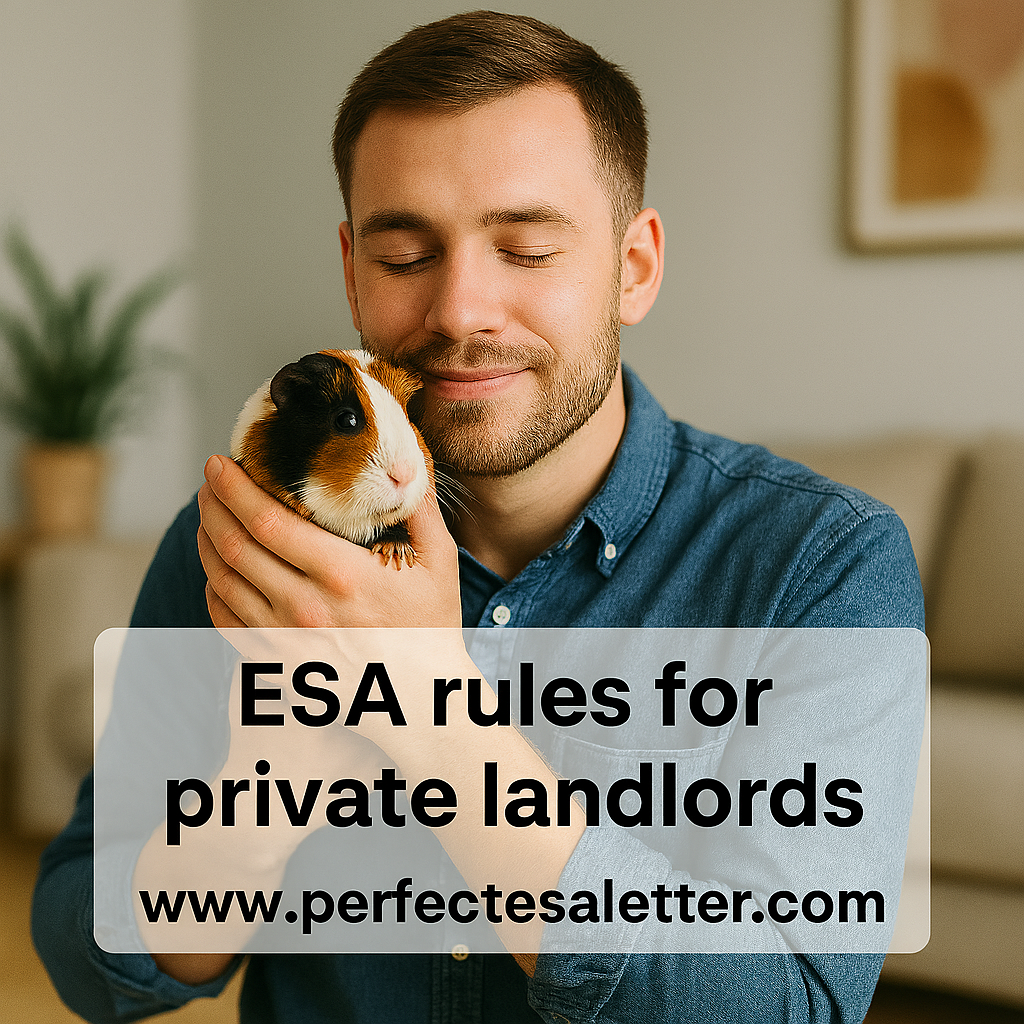ESA Rules for Private Landlords: A Complete Guide to Compliance
🐾 ESA Rules for Private Landlords: A Complete Guide to Compliance
For private landlords, renting property comes with many responsibilities—but one area that often creates confusion is the handling of Emotional Support Animals (ESAs). Unlike pets, ESAs are legally recognized as support companions for individuals with mental or emotional disabilities.
Understanding ESA rules for private landlords is crucial to avoid legal disputes, discrimination complaints, and potential fines. This article provides a detailed guide on the rights of tenants, the obligations of private landlords, and how to handle ESA accommodation requests.
”Get Yours Now!
Don’t wait until a landlord or airline tells you “no pets allowed.” Protect your rights today.
Please fill out this form and our team wil contact you ASAP.
Complete your assessment in minutes , get approved by a licensed professional, and receive your letter within 24 hours.
📖 1. What is an ESA and How it Differs from Pets?
- Pets are animals kept for companionship without special legal protections.
- Emotional Support Animals (ESAs) are prescribed by a licensed mental health professional (LMHP) to help with conditions like anxiety, depression, or PTSD.
- ESAs are not service animals, but they still receive housing protections under the law.
For landlords, this means ESAs cannot be treated as ordinary pets when it comes to housing rules.
📖 2. The Legal Framework: Fair Housing Act (FHA)
Under the Fair Housing Act (FHA), private landlords must provide reasonable accommodation for tenants with disabilities who require an ESA. This applies even if:
- The property has a “no pets” policy.
- The building enforces pet restrictions based on breed or size.
- The landlord typically charges pet rent, deposits, or fees.
Failure to comply may result in discrimination complaints and legal action.
📖 3. ESA Rules Private Landlords Must Follow
Here are the key obligations for private landlords:
- No Denial for ESAs – Landlords cannot refuse housing simply because a tenant has an ESA.
- No Pet Fees or Deposits – ESA owners are exempt from extra charges tied to pets.
- No Breed or Size Restrictions – Landlords must accommodate ESAs regardless of the animal’s breed or size.
- Prompt Response to Requests – Accommodation requests must be handled in a timely, fair manner.
- Confidentiality – Landlords cannot demand excessive medical records, only an ESA letter from a licensed professional.
📖 4. ESA Documentation Requirements
Tenants must provide valid documentation for their ESA. This usually includes:
- A signed letter from a licensed mental health professional (LMHP).
- Confirmation that the tenant has a disability.
- Explanation that the ESA is needed for emotional or psychological support.
Private landlords are allowed to verify authenticity but cannot demand sensitive health details.
📖 5. When Can Private Landlords Deny an ESA?
Although ESA protections are strong, landlords may deny requests in limited cases:
- Direct Threat – If the animal poses a safety risk to others.
- Property Damage – If the ESA has caused significant harm to property.
- Undue Financial/Administrative Burden – Rare cases where accommodating an ESA is unreasonable.
These exceptions must be backed by evidence—not assumptions or personal opinions.
📖 6. Common Misunderstandings Among Private Landlords
- ❌ “My property is exempt because it’s private.” → Wrong. The FHA applies to most private rentals.
- ❌ “I can charge a pet deposit for ESAs.” → Incorrect. ESAs are not subject to pet fees.
- ❌ “I can reject certain ESA breeds.” → Illegal. Breed restrictions don’t apply to ESAs.
- ❌ “I need full medical proof from the tenant.” → Not true. Only an ESA letter is required.
Understanding these rules prevents costly legal battles.
📖 7. Tenant Rights vs. Landlord Rights
- Tenant Rights: Live with ESA without pet fees, breed restrictions, or risk of denial.
- Landlord Rights: Verify ESA documentation, enforce standard lease rules (noise, cleanliness), deny only if ESA creates a direct risk.
Balancing rights is essential to maintain fair housing practices.
📖 8. Potential Penalties for Non-Compliance
Private landlords who violate ESA housing rules may face:
- HUD investigations
- Civil lawsuits
- Financial penalties
- Reputation damage
In some cases, landlords have been ordered to pay damages, refund illegal fees, and provide housing accommodations.
📖 9. Best Practices for Private Landlords
- Update Lease Agreements – Include ESA policies separate from pet clauses.
- Create a Clear ESA Request Process – Outline steps for tenants to submit documentation.
- Train Property Managers – Ensure all staff understand ESA laws.
- Maintain Professional Boundaries – Treat ESA requests like any other disability accommodation.
- Seek Legal Guidance – When in doubt, consult a housing attorney.
📖 10. Case Examples
- Case 1: No-Pet Policy Overruled – A landlord was forced to allow an ESA despite strict rental rules.
- Case 2: Illegal Fees Refunded – Tenant won a refund after being charged $300 “pet rent” for an ESA.
- Case 3: Breed Ban Removed – Court ruled against a landlord who tried to enforce a pit bull ban on an ESA.
These examples highlight why compliance with ESA rules is crucial.
📖 11. Final Thoughts
Private landlords must recognize that Emotional Support Animals are not pets but vital companions protected under housing law. By following ESA rules, landlords not only stay compliant but also support the well-being of tenants with disabilities.
Failing to comply risks legal disputes, while proper handling builds trust, fairness, and stronger landlord-tenant relationships.
”Get Yours Now!
Don’t wait until a landlord or airline tells you “no pets allowed.” Protect your rights today.
Please fill out this form and our team wil contact you ASAP.
Complete your assessment in minutes , get approved by a licensed professional, and receive your letter within 24 hours.

